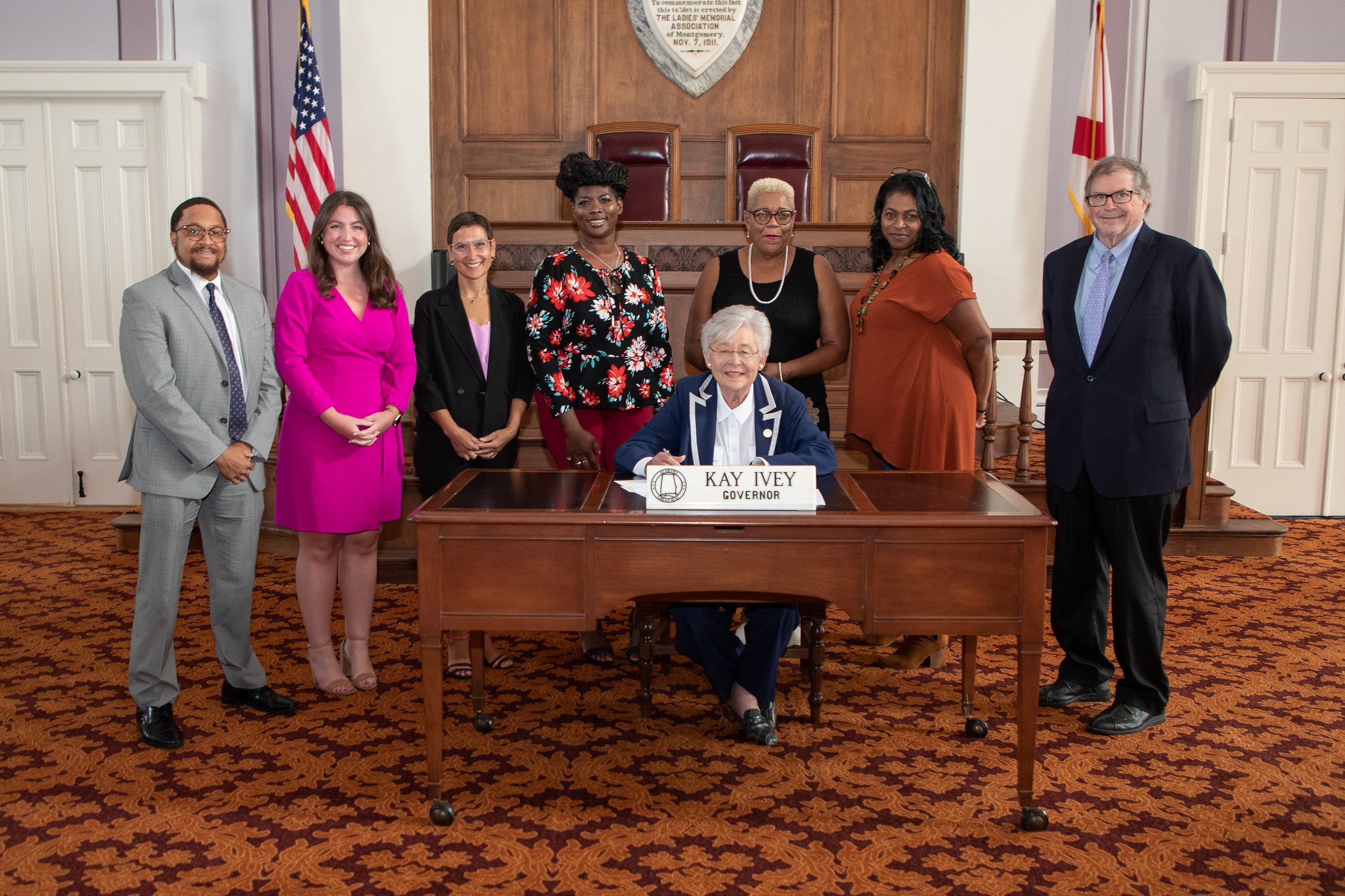By Leah Nelson, Research Director

Governor Kay Ivey signs SB154 into law with (from l to r) Frederick Spight, Elaine Burdeshaw, Leah Nelson, Teon Smith, Callie Greer, Faye Mitchell, and Rep. Tim Wadsworth. Photo by Billy Pope.
When Teon Smith and I got to talking at a June 2018 event for people who needed legal assistance, I think it’s fair to say that neither of us expected we were making an acquaintance that would change Alabama law for the better. Yet almost exactly five years later, here we are, watching Gov. Kay Ivey sign a bill we helped advocate for that will do just that.
I spent a lot of 2018 camped out at events like the one where I met Teon, asking people to take surveys for some research on how court debt haunts people for years, impeding their ability to work, earn, parent, and live freely.
Teon made an impression right away: striking, thoughtful, with four gorgeous children in tow. After she took the survey, she shared about how excited she had been to earn her associate degree recently and how devastated she was when she learned that her driver’s license was suspended due to unpaid tickets. Without her license, she struggled to find a steady job and was working irregular hours at a low-paying job at a mall store. She was scared every time she drove, and her pay was so low that “we run out of food, for real,” she said.
Teon and I kept in touch. In November 2018, she told me she had a court date where she hoped the judge would agree to accept an installment on her payment plan and give her a clearance letter allowing her license to be reinstated. It was a pay docket day, and the courtroom was packed as church on Easter – except for the judge’s bench up front, which was empty when I arrived. I asked a man in the back row if I was in the right courtroom. “Ain’t no judge in this m*****f***ing courtroom,” came the answer.
The judge never showed up. Instead, two court staffers sat in his place making decisions that would affect the lives of hundreds of litigants. Teon offered evidence of her dire financial circumstances, but they rejected it, telling her that she had to pay her roughly $1,400 balance in full or she could not have her license back. They told her she had to pay at least some money that day or she would be jailed. She paid what she could and went back to the life that was waiting for her.
I met Faye Mitchell around the same time. She was recently out of prison and thrilled to have a job as a housekeeper at a Montgomery church. It was summer, and she was walking to work, she told me, because her license had been suspended due to a court hearing she had missed while she was incarcerated. The clerk in Brookside, Alabama, which had issued the suspension, wouldn’t tell her what she needed to do to get it back. The clerk said Faye would have to come to the courthouse to find out – and that on arrival, she would be arrested and held until a judge found time to see her.
“I wanted to be able to go ahead and just – what is it that I need to pay, what is it that I need to do?” Faye told me that summer. “What I’m facing now is not really being able to go handle it myself for fear of being locked back up.”
“I just got this new job. I cannot afford to not be at work,” she said.
Through Appleseed, Teon and Faye found lawyers who helped get their licenses back, but it was clear to our team that this problem was not best tackled one person at a time. As things stood, a single missed payment or court date could result in a suspended license, triggering an avalanche of consequences like job loss and food insecurity. It was going to take a change in law to meaningfully reduce the harm caused by debt-based drivers license suspensions.
Over the next several years, our team worked with lawmakers and experts to devise a bill that would balance compassion with accountability, making space for people like Teon and Faye to experience financial or other setbacks without immediately losing their licenses while maintaining consequences for people who flout the law by ignoring their tickets entirely. The bill that passed in 2023 allows people to miss up to two payments on a payment plan (like Teon did) or one compliance hearing (like Faye did) before their license can be suspended. It also requires judges to clear people for license reinstatement when they show up in traffic court.
Our campaign drew on support and expertise from economists, social workers, educators, faith leaders, and law enforcement officials who believed change in law would be an investment in safety and prosperity. In May, the bill passed unanimously in Alabama’s Senate and received overwhelming support in the House.
Its passage doesn’t solve every problem Teon and Faye might face. Life is complicated, especially for people who lack savings and juggle work and childcare obligations. But it does remove a major obstacle that held both women back for far too long. And it reinforces the idea that thoughtful, evidence-based advocacy can achieve results everyone can be proud of.
And today, in a state where policymaking too often benefits the wealthy and reinforces the rights of the already-comfortable, Teon and Faye stood behind our governor as she signed a piece of legislation aimed specifically at making their lives freer.
That, I believe, is a win for us all.





Leave a Reply
Want to join the discussion?Feel free to contribute!